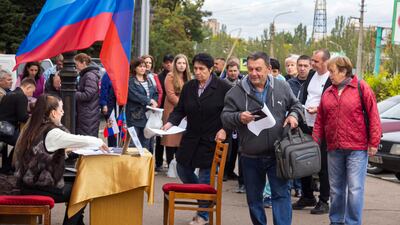Britain has announced a series of sanctions against dozens of people and companies, including Russian President Vladimir Putin’s “favourite PR agency”, in response to Moscow's “sham” referendums in four occupied regions of Ukraine.
More than 90 entities, including officials and collaborators in charge of hastily organising the votes, have been named in the Conservative government’s latest round of punitive measures against those linked to Mr Putin.
Foreign Secretary James Cleverly condemned the votes “held at the barrel of a gun” in the oblasts of Luhansk, Donetsk, Zaporizhzhia and Kherson, and insisted the UK would not recognise the results.
“They follow a clear pattern of violence, intimidation, torture and forced deportations in the areas of Ukraine Russia has seized,” Mr Cleverly said.
“Today’s sanctions will target those behind these sham votes, as well as the individuals that continue to prop up the Russian regime’s war of aggression. We stand with the Ukrainian people and our support will continue as long as it takes to restore their sovereignty.”
Moscow last week launched the annexation referendums asking people in the regions if they want to be part of Russia.
The Donbas regions of Luhansk and Donetsk were recognised by Russia as independent republics earlier this year, shortly before the full-scale invasion of Ukraine was launched in February.
The UK government accused Russia of staging the votes “in a desperate attempt to grab land and justify their illegal war” following a string of battlefield successes for Kyiv, in which Ukrainian forces retook vast parts of the north-east.

Britain said the process reflects Russia’s conduct in 2014 when it annexed Crimea using “disinformation, intimidation and fake results”.
Thirty-three people who helped arrange the referendums have been sanctioned, including Vice Admiral Sergei Yeliseyev, who was recently installed by Moscow to lead the Kherson regional authority. He defected from the Ukrainian navy in 2014, the same year Russia annexed the Crimean peninsula, and has since “continued to undermine the independence of Ukraine”.
Ivan Kusov, the education and science minister in Luhansk, has also been sanctioned over his work to integrate the local school system into the Russian curriculum. Evgeniy Solntsev, deputy chairman of the so-called Donetsk People’s Republic, and Yevhen Balytskyi, the Russian-installed leader of the Zaporizhzhia authority, were also included on the list.
IMA Consulting, which Britain branded Mr Putin's “favourite PR agency”, was also hit by sanctions after it was said to have been hired to manage the public campaigns for the referendums.
Goznak, a security documents company known for its monopoly on the production of “tens of millions” of state documents including expedited passports in the territories, has also been sanctioned.
Four oligarchs with a combined global net worth estimated at £6.3 billion have also been slapped with punitive measures. They include Azerbaijan-born philanthropist God Nisanov and his long-time business partner Zarakh Iliev, known as the “kings of Russian real estate”, who have a reported joint global net worth of £2bn.
Igor Makarov, president and owner of Areti International Group, a major investor in the oil and gas sector, has also been named in the sanctions.
Others included in the package are 55 board members of state-linked organisations such as Gazprombank that continue to bankroll the Russian war machine.
The latest round bring the total number of people sanctioned by the UK to more than 1,200, including about 120 oligarchs with an estimated combined global net worth of more than £130bn.
The sanctions were announced on Monday after British military intelligence said that new Russian recruits in Ukraine are likely to face a “high attrition rate” due to inadequate training.
Mr Putin last week announced a plan to mobilise 300,000 fighters for the war in Ukraine in the country’s first compulsory military draft since the Second World War.
The country moved quickly to draft reserves, issuing “many tens of thousands” of call-up papers in the days following, the UK’s Ministry of Defence said in an update on Twitter.
“The initial tranches of men called up under Russia’s partial mobilisation have started arriving at military bases,” the ministry said.
“Russia will now face an administrative and logistical challenge to provide training for the troops.”














